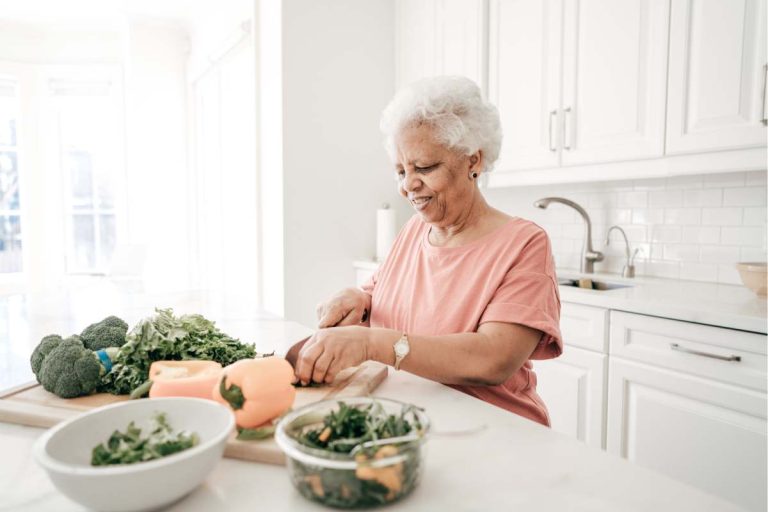Ensure Healthy Senior Meals
Not everyone enjoys cooking, and for seniors, preparing nutritious meals can become a challenge due to health conditions, mobility issues, or simply a lack of interest. However, maintaining a balanced diet is crucial for overall well-being. The good news? There are plenty of ways to enjoy healthy meals without having to cook from scratch. Whether it’s meal delivery services, smart grocery shopping, or making mealtime a social experience, this guide will help you find practical solutions to ensure healthy eating.
Table of Contents
1. Meal Delivery Services: A Convenient Solution
For seniors who want ready-to-eat meals without the hassle of cooking, meal delivery services are a great option. Companies specializing in senior nutrition offer balanced meals tailored to dietary needs, such as heart-friendly, diabetic-friendly, or low-sodium options.
Key Considerations When Choosing a Service:
- Nutritional Balance: Ensure meals include a good mix of protein, fiber, and healthy fats.
- Cost and Subscription Plans: Some services offer discounts for seniors or Medicare coverage.
- Customization: Look for options that cater to dietary restrictions or preferences.
Popular services like Silver Cuisine by BistroMD or Mom’s Meals offer nationwide delivery, making it easier to maintain a healthy diet without the stress of meal prep.
2. Pre-Packaged Healthy Meals: What to Look For
Grocery stores offer a variety of pre-packaged meals that can be a quick and easy alternative to home cooking. The key is to choose wisely and avoid highly processed foods that are loaded with sodium and preservatives.
Tips for Smart Grocery Shopping:
- Opt for frozen meals labeled “low sodium” or “high protein.”
- Choose pre-chopped fresh vegetables and lean proteins that require minimal preparation.
- Look for healthy soups, salads, and grain bowls that provide balanced nutrition without extra effort.
- Supplement meals with yogurt, nuts, or fruit for added vitamins and minerals.
3. Hiring a Meal Prep Assistant or Caregiver
For seniors who prefer home-cooked meals but lack the ability or motivation to cook, hiring a caregiver or meal prep assistant can be a game changer. A professional can help with grocery shopping, meal planning, and preparation, ensuring that nutritious meals are always available.
Options to Consider:
- Part-time meal prep services for those who need occasional help.
- Full-time caregivers who provide cooking assistance alongside other daily tasks.
- Community programs that offer affordable meal prep support for seniors.
Local agencies and online platforms like Care.com can connect seniors with qualified professionals who specialize in senior nutrition and home meal preparation.
4. Making Mealtime Social and Engaging
Eating alone can sometimes lead to poor nutrition and reduced appetite. Socializing during meals can make eating more enjoyable and even encourage healthier choices.
Ways to Make Meals More Engaging:
- Join a senior meal program. Many community centers offer group dining experiences for older adults.
- Host virtual meals. If in-person dining isn’t possible, video calls with family and friends can make meals feel less lonely.
- Dine with a caregiver or neighbor. Finding a meal buddy can add companionship to everyday eating.
- Try themed meals. Adding variety, such as “Meatless Mondays” or “Soup Sundays,” can keep meals exciting.
Making meals a social experience not only improves mood but can also have a positive impact on overall health.
5. The Cost of Live-In Care for Meal Support and Beyond
For seniors who require full-time assistance, live-in caregivers can provide meal support as part of their services. Live-in care costs for elderly individuals vary depending on location, level of assistance needed, and agency fees. On average, the cost ranges from $3,500 to $10,000 per month.
Factors That Affect the Cost:
- Location: Urban areas tend to have higher caregiver rates.
- Meal Prep Needs: Specialized diets or frequent meal preparation may increase costs.
- Additional Services: Assistance with medication, mobility, or housekeeping can impact pricing.
For those who don’t need full-time care, alternative solutions like part-time meal prep services or community meal programs may be more budget-friendly.
6. Simple Meal Prep Strategies for Seniors Who Live Alone
Even if cooking isn’t a priority, having a few simple strategies can help seniors maintain a healthy diet with minimal effort.
Easy No-Cook Meal Ideas:
- Greek yogurt with granola and berries for a quick breakfast.
- Tuna or chicken salad wraps using whole wheat tortillas.
- Hummus and vegetable platters for a nutritious snack.
- Oatmeal with nuts and dried fruit for a fiber-rich option.
Helpful Kitchen Gadgets:
- Electric kettles for quick oatmeal or soup prep.
- Blenders for easy smoothies packed with nutrients.
- Slow cookers to prepare meals in bulk with minimal effort.
Conclusion
Cooking isn’t the only way to ensure a healthy diet. With meal delivery services, pre-packaged nutritious options, caregivers, and social dining experiences, seniors can enjoy delicious and well-balanced meals without the stress of cooking. Whether it’s finding a part-time assistant, joining a meal program, or making small grocery changes, there’s a solution for everyone. Start exploring these options today to create a healthier, more enjoyable eating experience!


